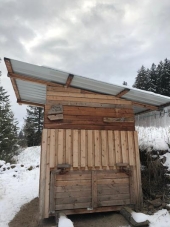




 3
3




"The rule of no realm is mine. But all worthy things that are in peril as the world now stands, these are my care. And for my part, I shall not wholly fail in my task if anything that passes through this night can still grow fairer or bear fruit and flower again in days to come. For I too am a steward. Did you not know?" Gandolf

 4
4




List of Bryant RedHawk's Epic Soil Series Threads We love visitors, that's why we live in a secluded cabin deep in the woods. "Buzzard's Roost (Asnikiye Heca) Farm." Promoting permaculture to save our planet.
 7
7
















 3
3




List of Bryant RedHawk's Epic Soil Series Threads We love visitors, that's why we live in a secluded cabin deep in the woods. "Buzzard's Roost (Asnikiye Heca) Farm." Promoting permaculture to save our planet.
 2
2




∞
 2
2




 2
2




 1
1
















 3
3




List of Bryant RedHawk's Epic Soil Series Threads We love visitors, that's why we live in a secluded cabin deep in the woods. "Buzzard's Roost (Asnikiye Heca) Farm." Promoting permaculture to save our planet.
 1
1




 3
3




Permaculture...picking the lock back to Eden since 1978.
Pics of my Forest Garden




Susan Wakeman wrote:Thank you for this excellent discussion. I'm a little confused though how somebody with high lead soil should proceed. Here's what I gather from this thread. Please correct or comment:
1. Introduce fungi such as oyster or wine cap and their food. Fungi slow the uptake of heavy metals by plants. Are the fruit bodies healthy to eat? What happens if you keep chicken in such a plot, will their eggs and meat have a higher level of heavy metals?
2. Fruit are safe to eat.
3. Phytoremediation by planting brassica and sunflower. Surely you need to dispose of the plants off site?
4. Planting vegetables in raised beds. This supposes that they root only in the brought in soil. However veg root much deeper than we suppose. Up to several metres I've read. Is that not in contradiction to point three?












 1
1




List of Bryant RedHawk's Epic Soil Series Threads We love visitors, that's why we live in a secluded cabin deep in the woods. "Buzzard's Roost (Asnikiye Heca) Farm." Promoting permaculture to save our planet.
 5
5




Visit Redhawk's soil series: https://permies.com/wiki/redhawk-soil
How permies.com works: https://permies.com/wiki/34193/permies-works-links-threads
 1
1




Chris
Gardening in the UK and loving it in spite of the heavy clay, deer, pheasants, slugs....








Kathleen Kroessler wrote:Actually sunflowers are Used in India for phytoremediation to clean up toxic sites they actually absorb so much lead that you can smelt the seeds and obtain lead from them. So you were wrong in thinking that plants Don’t absorb heavy metals because of their carbon compounds structure




 4
4




I'm relying on my very old (and slightly shaky) memory here of books I read and chemistry and physics classes I took. Lead is lead is lead - it's an atom and barring living in the Sun, it will always be lead. However, just as Carbon (also an atom) can do good things when combined with other atoms to build trees and plants, it can do not-always-good things like combining with oxygen to become CO2 (fine in small amounts, but too much in a small, unventilated space and it will kill humans faster than lack of oxygen does.) So Bruce used the word "transforms" and that's not wrong, but I prefer the word "sequester" be included. In other words, from what I read, the fungi can sequester the lead (and a number of other equally nasty atoms or compounds) by turning it into more stable, less harmful compounds. Now we really need a good Chemist!bruce Fine wrote:as jay says, I would imagine that the fruits of plants that suck up lead would have to be removed to be contained with other hazmats. and not to be consumed. If fungi transforms the lead rather than accumulating it in the growth, which I had no idea about till just now that sound like an ideal way to go. if that is what the fungi does.
Visit Redhawk's soil series: https://permies.com/wiki/redhawk-soil
How permies.com works: https://permies.com/wiki/34193/permies-works-links-threads












 2
2




List of Bryant RedHawk's Epic Soil Series Threads We love visitors, that's why we live in a secluded cabin deep in the woods. "Buzzard's Roost (Asnikiye Heca) Farm." Promoting permaculture to save our planet.




Visit Redhawk's soil series: https://permies.com/wiki/redhawk-soil
How permies.com works: https://permies.com/wiki/34193/permies-works-links-threads
 4
4




Iterations are fine, we don't have to be perfect
My 2nd Location:Florida HardinessZone:10 AHS:10 GDD:8500 Rainfall:2in/mth winter, 8in/mth summer, Soil:Sand pH8 Flat












 2
2




List of Bryant RedHawk's Epic Soil Series Threads We love visitors, that's why we live in a secluded cabin deep in the woods. "Buzzard's Roost (Asnikiye Heca) Farm." Promoting permaculture to save our planet.

|
You ridiculous clown, did you think you could get away with it? This is my favorite tiny ad!
turnkey permaculture paradise for zero monies
https://permies.com/t/267198/turnkey-permaculture-paradise-monies
|





